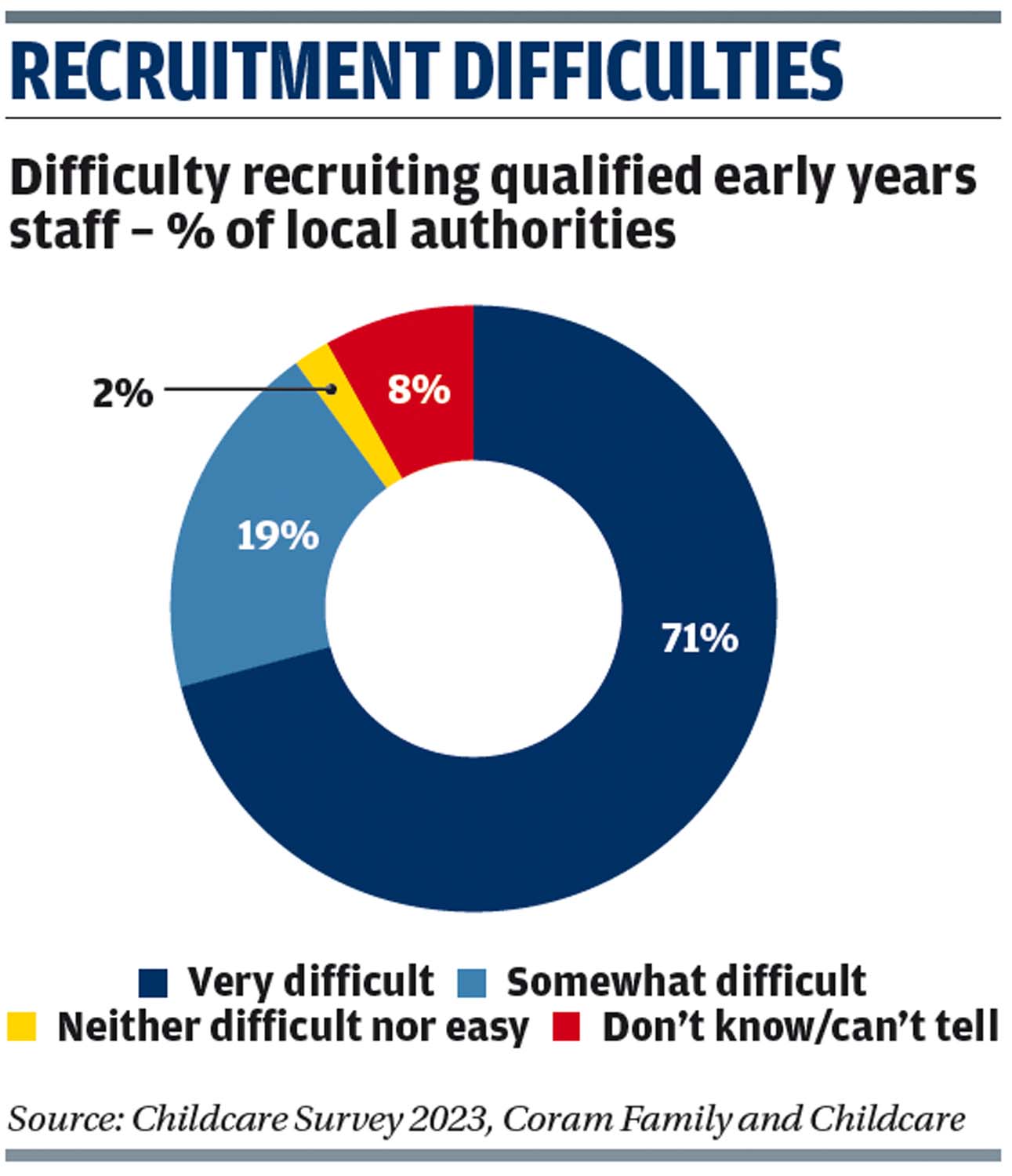
Almost half – 48 per cent – of councils surveyed by the charity Coram this year said local providers had cut staff numbers due to rising costs. About seven in 10 councils said recruitment and retention of staff was a key factor affecting sustainability of childcare provision and around the same proportion – 71 per cent – of local authorities said settings were finding it “very difficult” to recruit staff with the right qualifications and experience.
The latest Ofsted figures show there were 4,800 fewer providers as of March 2023 than the previous year.
The government is looking to extend free childcare offers for working parents over the next two years. But councils are warning that nursery closures “will undermine capacity” ahead of this extension.
A survey of councils by the Local Government Association in July this year found that fewer than half believe their area has enough places to meet demand.
To meet the expansion of free hours, staff-to-child ratios for two-year-olds in England will be relaxed from 1:4 to 1:5 from September 2023, a move that is “appalling” for an already “overwhelmed and overburdened workforce”, according to Early Years Alliance (EYA) chief executive Neil Leitch. According to an EYA survey, eight in 10 of its members say they are already stressed.

Childminders
Latest Ofsted figures show childminder numbers have dropped by 46 per cent over the last decade, from 55,600 in 2012/13 to 29,600 in 2021/22. In the 12 months to March 2023, their numbers dropped by 3,500.
Government action being taken to boost childminder numbers includes offering incentives to new recruits from this autumn of £600, or £1,200 for those that sign on with an agency. Children's minister Claire Coutinho has said the government is looking at ways to reduce isolation and loneliness in the profession such as encouraging childminders to work together in non-domestic premises such as village halls.
Levels 2 and 3
Staff with a Department for Education-approved Level 2 qualification are known as early years practitioners and apprenticeships at this level are available.
Level 3 qualified staff are known as early years educators. A new set of criteria for the role, including an improved focus on safeguarding, will come into effect in September 2024.
The government is also considering removing a requirement for Level 3 early educators to hold a Maths GCSE or equivalent, as part of a wider consultation on the early years foundation stage, which sets standards for learning and development and care for children. Leitch says this requirement has been “a particular barrier” to recruitment.
A Level 3 Education and Childcare T-Level has also been available since 2020.
Degrees and foundation degrees
Level 6 Early Childhood Studies degrees are available from universities. These can include Early Childhood Graduate Practitioner competencies, developed by the Early Childhood Studies Degree Network, to prove graduates can put their learning into practice, in areas such as children's rights.
Level 5 early years foundation degrees supported by professional body, Sector Endorsed Foundation Degrees in Early Years, are also available. These can be topped up to a full degree.
A Level 5 Early Years Lead Practitioner Apprenticeship offers early years career progression through practice leadership. An 18-month National Professional Qualification for Early Years Leadership is available, aimed at managers or aspiring managers of nurseries, or childminders with leadership responsibilities.
Post-qualifying training
Through the government's Early Years Education Recovery Programme 18 “practice hubs” are being set up to share good practice, offer mentoring and evidence-based development for early years practitioners. They have been funded for two years until the end of 2024 and are supported by the Education Endowment Foundation and National Children's Bureau.
Early Years Initial Teacher Training is also available as a postgraduate course, as well as for undergraduates and experienced practitioners, including those who gained their qualifications overseas.
Sector bodies such as the Professional Association for Childcare and Early Years, the National Day Nurseries Association and the EYA deliver online and face-to-face training.
SEND
The government wants 5,000 more early years practitioners with a special educational needs co-ordinator (Senco) qualification. The Best Practice Network has been appointed to deliver fully funded, four-month Early Years Senco Level 3 courses. The qualification is being funded through the DfE's education recovery package, to help children catch up on their learning and development following the Covid pandemic.
PLAY
Although play schemes in England are not required to employ staff with childcare or play qualifications, there are several courses and qualifications available in this sector.
City & Guilds offers a Level 2 award, certificate and diploma in playwork and in 2022 NCFE introduced a new suite of playwork qualifications including a NFCE Cache Level 2 diploma. A Level 3 certificate in understanding playwork, a diploma in playwork and award in transition to playwork are also available.
TQUK offers a Level 2 diploma for the playwork practitioner and learners can progress to either a playwork apprenticeship or a Level 3 diploma in playwork.
From September 2022 settings in Wales that offer out-of-school and holiday provision needed to ensure an “appropriate proportion of staff are suitably qualified”.
In Wales there is also a NCFE Cache Level 5 diploma in advanced playwork available for those looking to develop their skills, who are aged at least 19, with a minimum qualification at Level 3 and already working unsupervised in play settings.
A BA (Hons) in childhood development and playwork is available from Leeds Beckett University and the University of Gloucestershire's Playwork Partnership courses are available through the university or local trained providers.

